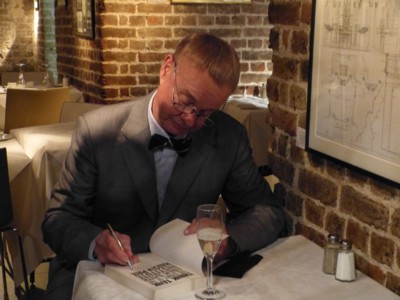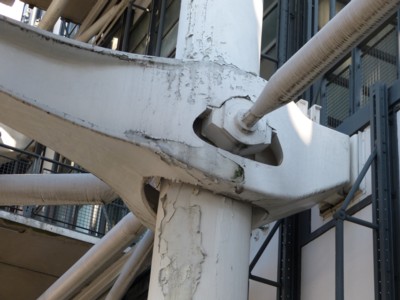We are developing the social individualist meta-context for the future. From the very serious to the extremely frivolous... lets see what is on the mind of the Samizdata people.
Samizdata, derived from Samizdat /n. - a system of clandestine publication of banned literature in the USSR [Russ.,= self-publishing house]
|
An MP gets drunk and goes berserk:
Was Eric Joyce MP perhaps trying to stimulate the economy? I found that link in this ancient posting here by Paul Marks.
Guido, where I found the above picture, is all over it, as you would expect.
I know, I know, all very regrettable. Not proper behaviour at all. But my immediate thoughts, when I first saw the Evening Standard front page headlines out in the London streets this afternoon, were: Would that all the rampages of the politicians did as little damage; and: If only, as here, they only tried to do damage to each other.
We already have a ‘Samizdata quote of the day’ for today, but, yes, here are seven more. I wrote them down over last Christmas, and then forgot about them. Ant then today, I encountered them again. They still make me smile, so here they all are for you good people.
First, a couple of things said by Patsy Stone, the amazing fashion monstress played by Joanna Lumley in Absolutely Fabulous. Over Christmas there were two new episodes. So much for my “complete” box set that I found in a charity shop last year.
On the terribleness of the recent riots in London:
Oh I don’t know. Nothing wrong with a bit of extreme shopping.
On the drugs issue:
Have you seen the price of methadone? It’s cheaper to buy crack.
Also on a fashion theme, from one of those Father Christmas in a New York Shopping Store movies, said by the Lady Boss:
I don’t know if large women care what they look like, but if they do, let’s exploit them.
That’s the spirit. And depending on how the project turns out:
This is either the smartest decision I’ve ever made or the stupidest decision you’ve ever made.
Which has to be a very old joke, but like I say, it made me smile.
Next, this from the Headmistress of St Trinian’s (played by Rupert Everett), about her (I think) brother (also Rupert Everett), to her brother’s daughter:
Your father has a short memory masquerading as a clear conscience.
Finally a couple of overhearings from BBC Radio 3. Here’s something from the recently deceased Gustav Leonhardt, about and with whom they did a commemorative Music Matters show, featuring a recorded interview with him. Leonhardt is explaining why the biographical details of the lives of the great composers don’t interest him that much, only their music.
When you meet a genius, you don’t know he is one. He is only a genius when he is at work.
Finally, here is Professor Robert Winston, ruminating on science, in between introducing some of his classical favourites with Rob Cowan:
Uncertainty is a good place to be. It worries me when governments take a very assertive position on the basis of very weak evidence and then stick to it.
The phrase “climate science” was never uttered, but you got the distinct feeling that this particular Public Voice is thinking that CAGW is a band-waggon that it now makes more sense to get off rather than to shout from. I must remember to email the Bishop about that.
Something tells me that the CAGW-ists will, any year now, start having short memories masquerading as clear consciences.
As already mentioned here from time to time in recent weeks, I have been doing some tidying up. My place was a mess. More politely, it was suffering from severe infrastructure overload, which is that terrible condition that sets in when each new thing that comes in or gets done causes a wave of knock-on chaos out of all proportion to what ought to be its impact. To put this down, I make some space for it by moving this important item, on top of that important item, and then forget where it all is … you get the picture.
If you have never in your life suffered thus, that can only be because you have never done anything. Places where real stuff gets done frequently teeter on the edge of chaos. This is another Parkinson’s Law. I recall, in one of his books, contrasting pictures: of the Officers Mess (not a mess at all), and the Orderly Room (not orderly at all). The point being that it was in the latter place that all the work got done.
But there comes a time when consoling yourself with the thought of all those chaos-inducing accomplishments just doesn’t do it for you any more. You just have to stop – at the very least interrupt – everything else and turn back the tide, which is what I have forced myself recently to do. This has already the most serious tide resistance I have done since moving in here over two decades ago.
My problem was that although this task had become slowly more important, it had at no point become overwhemlingly urgent. So, how was I to motivate myself to get stuck into it? No externally imposed deadline loomed. No angry associates would punish me if I delayed. It was merely that if I delayed it yet longer, my life would work gradually less and less well.
If you are the sort of person who needs only to know that some task is important in order to start attacking it with enthusiasm, confident that you will conquer it, then this posting is probably not for you. If on the other hand you are like me, easily daunted and tempted hideously to postpone tasks which combine non-urgency, great importance (but only to you) and demoralising hugeness, then maybe skipping this might be an omission of significance. If the question “where do I start?” regularly recurs in your life, then read on. You might discover things of value. → Continue reading: Urgent and Important versus Easy – on tidying up my home – and on how to do libertarianism
Madsen Pirie’s new book, Think Tank: The Story of the Adam Smith Institute was launched earlier this evening in the crypt of St John’s, Smith Square. Here is what it says in the book’s first chapter, entitled “Shaping an institute” (pp. 3-4):
There was an institute in London which drew heavily on Smith’s ideas, and those of the free-market economists who had followed in his wake. This was the Institute of Economic Affairs (lEA), founded by Sir Antony Fisher twenty years earlier, and which had published a steady stream of monographs analyzing the deficiencies of central direction, state planning and economic intervention. They were intellectually rigorous, and had made their way into the literature of economics libraries, albeit in a separate corner, almost fenced off from the mainstream.
But we wanted something more. It was all very well to win theoretical arguments, but nothing seemed to happen afterwards. Governments continued on their unruly ways, while academics devised new follies to set up on the wreckage of the old ones. We wanted to change reality; to have an impact on what actually happened. We wanted to make policy.
Adam Smith might have been one strong influence on our thinking, but there were others. One was James Buchanan, the Nobel Laureate who, with Gordon Tullock, James Niskanen and others, developed what came to be known as Public Choice Theory. In essence ‘it took the ideas of economics into the domain of politics and administration. Instead of ‘treating politicians and civil servants as selfless seekers after public good, the theory treated them as if they were ordinary economic participants, out to maximize their own advantage, just like other people. it proved a very fertile theory tor explaining what would otherwise have been incomprehensible outcomes. It also fitted in with the rather less than respectful way that we ourselves regarded politicians.
Public Choice told us how minority interest groups could hijack the political agenda to have advantages created for themselves. It explained how politicians respond to pressure from vociferous and self-interested groups, but not from a public at large which might be largely unconscious of the effect policy made upon it. Public Choice Theory was basically a critique, but we began to wonder if there could be a creative counterpart to it. Just as Public Choice Theory told us why certain policies were doomed to political failure, however economically sound they might be, could it not be used to create policies that would not be subject to these limitations? Could new free-market strategies be crafted that flowed with political reality by building in the support of the interest groups which might otherwise derail them?
This was powerful stuff. …
Indeed it was. As soon as I’ve read the rest of this book, I’ll tell you what I think of it.
Meanwhile, here is a picture I took at the launch, of the author hard at work signing copies.
Not surprisingly, the ASI blog already has a posting up on the subject.
Last night I went to the cinema, which I rarely do nowadays, and judging by the size of the audience for the movie that I and my friend saw, not many other people go to the cinema these days either. The place, in the heart of the London West End, was damn near deserted, apart from us and about three other people. Actually, though, the problem was probably the movie we were seeing, as I will now explain.
The movie we saw was Margin Call. Here is a short Rolling Stone review of it, which strikes me as pretty much on the money.
Okay: SPOILER ALERT. Stop reading this very soon if you don’t want the broad outlines of the plot handed to you on a plate.
When I started watching it, I knew nothing about Margin Call other than that a friend of the friend I was with had said it was the best current financial crisis movie he knew of. This makes sense. Margin Call is very much a trader’s eye view of the moment when the first of the waste matter started to move seriously towards the fan, around 2008. And, remarkable to relate, it actually shows “capitalism” (the quotes being because we all here know how government-intervened-in all these sorts of market have been) in a by no means wholly bad light. I am not a bit surprised now to have learned, the morning after, that this movie was written and directed by an ex-trader, a certain J. C. Chandor.
Plot approaching. Final warning. → Continue reading: What capitalism does when the music stops
From a Cricinfo piece by George Dobell, about the one day cricket international between Afghanistan and Pakistan, played in the United Arab Emirates yesterday:
A spokesman for the Taliban contacted the Afghanistan Cricket Board on the morning of the game to wish the team well and assure them they would be remembered in their prayers.
Pakistan won at a canter, but the Afghans did not disgrace themselves, in their first ODI against a top ranked, Full Member, test playing nation.
Afghan minister of finance Dr Omar Zakhilwal:
“The event appears to have united the entire country. … There is nothing that can touch cricket in popularity or as a force for good in Afghanistan. There is absolutely nothing else that mobilises our society in the same way. Not politics, political events or reconstruction.”
Cricket, says Dobell, is booming in Afghanistan:
Not only is the international team now full time, but there are league teams in 28 of the 34 provinces …
However, Dobell goes on to report that:
… the sport will be made compulsory as part of the school curriculum.
And you get the definite feeling that Dobell thinks that’s good. I am a rabid cricket fan, but I say that nothing puts many people off a sport more completely than being made to play it against their will. For sport, read: anything.
I remember school contemporaries who would have preferred being in the Taliban to playing bloody cricket.
I love movie posters, and I especially love movie posters that I have already seen in London, translated into someone else’s language, for somewhere else. So, I love this:
These are all over Paris just now, as are huge pictures of Kate Beckinsale (star of Underworld – Nouvelle Ere) and a smaller one of Gary Oldman in Tinker, Tailor, Soldier, Spy, known here as La Taupe (the mole).
Johnathan Pearce promises that he will soon be reviewing the actual movie.
Yesterday Antoine and I visited the Pompidou Centre. Follow that link for the usual Pompidou Centre pictures. Here’s a less usual picture of the thing, in the form of a picture of a model of it that we encountered inside:
I was glad to visit this building, if only to go somewhere out of the cold, which has been extreme (and made much worse by the wind) but which may now be abating a little. Or maybe I’m just getting a little used to it.
I was glad also to get to see, close up, the inside of a much admired, much discussed piece of modern architecture, designed by Renzo Piano and Richard Rogers, Renzo Piano being the man who much more recently has designed London’s Shard. I don’t love all modern architecture, to put it mildly, but I find it a fascinating story.
The Pompidou Centre is an early example of a much practised style of recent years, namely the “structure and services as decoration” style. See also the London Stock Exchange Lloyds of London, designed by Rogers. In this style, architectural organs that are usually hidden inside the body of the building are instead taken out of the body and turned into visual features. As a result of using this style, Piano and Rogers turned what is basically a big urban slab into something a bit more interesting.
I have noticed that more recent examples in London of this now very common style have started out looking pretty good, but have then started to look … not so good. The trouble with decorative steel work is that it is very hard and very expensive to keep clean and smart, what with it being so very much more complicated than a mere flat surface, and so much harder to get at. And sure enough, there are Pompidou Centre details – details in full view of us visitors – which now look decidedly grubby, or worse.
The big outdoor staircase which is such a feature of the Pompidou Centre is a wonderful place to look out across (approximately speaking) the centre of Paris. The view of Montmartre and the Sacre Coeur is, in particular, spectacular.
And thank goodness for the glass, because without it the cold would have been unbearable. But, the glass is rather dirty, and a photographer like me, in among whooping with delight at the views, needs to pick his spot carefully.
And it gets worse. I was actually quite shocked to see things like this:
You expect this kind of run-downness in a now-aging provincial railway station, built in the eighties, given its last face-lift in 2000, and now in need of another. But in a prestige project in the middle of Paris, devoted to “culture” (which the French take very seriously indeed), named after a President? How did they let that happen? Answer: it’s very difficult and expensive to stop it.
I just read the above to Antoine, and he said: It’s the classic problem with a prestige project. There’s a huge photo op when it opens, but no photo op for just slapping on some new paint. Indeed. But, photography by just anyone (by which I mean the likes of me) rather changes that, doesn’t?
Inside the Pompidou Centre there was Art, which we also looked at. I hope to blog about this later, but promise nothing.
I am in Paris, staying with occasional Samizdatista Antoine Clarke.
Photoed out of the Eurostar on the way, the M25 bridge over the Thames:
When I got there and after I’d settled in, we went out for supper and then went walking for a while.
Arc de Triomphe:
Old internal customs duties office, which ceased functioning in 1943:
Antoine on Twitter this morning:
Ice cold in Paris … And those nice straight boulevards make wonderful wind tunnels.
Michael Jennings on Twitter:
Brian is having a good time then?
Antoine:
Likes this.
Bastard.
We were going to go out walking today, but instead will be indoors, either at Antoine’s home or in some museum.
I really liked that first Madsen Pirie short economics video, about the subjectivity of value, flagged up here. Now number 2 has emerged, on the closely related topic of price control. I happened upon this second video here, which would suggest that these things are getting around and being noticed. They should.
The short video lecture is the perfect medium for Madsen. Many is the time that I have had a short lecture on this or that topic bestowed upon me, by Madsen in person. From most others this would be intolerable. From him, it was welcome, because you had the feeling he had really thought it through, having bestowed it also on many others, each time slightly better. He has been working on these little videos for years, maybe realising it, maybe not. Almost always, when technologically enhanced things emerge that are really good, the person doing them has been doing them for quite a while by hand, as it were, before the technology came along to make the thing even better.
If the rest of these little videos are as good as the first two, they could add up to a classic set.
From the latest Radio Times:
9.00 Wonderland: My Child the Rioter
Last August’s riots provoked a legal backlash that has seen often lengthy prison sentences handed down to those involved. This documentary enters the homes of the some of the families affected, including that of Eileen and Alan Bretherton whose son Liam recently served in Afghanistan but got caught up in the unrest while home on leave. Now he is an ex-offender with a promising military career in tatters.
“Legal backlash” is, I suppose, one way to describe a severe punishment.
But the phrase that really caught my eye in this was where it says that son Liam got “caught up in” the unrest. You hear this phrase a lot these days, to describe what someone did, in a way that suggests that what he did was really done to him, by a malign outside force. The Unrest, you see, forced him to go out looting. The Unrest called round, knocked on his door, dragged him out into the street and there compelled him to misbehave. Liam didn’t do rioting. The rioting “involved” him. There the Unrest was, catching Liam up in itself. How could Liam himself be held responsible for what Unrest did to him?
Truly, we do live in a Wonderland.
And what of that “legal backlash”? (There goes another phrase which makes a bunch of decisions appear like a mere collective emotional spasm.) Well, next time Unrest decides, for its own inscrutable reasons, to reach out and grab people, more of them will surely decide to resist being caught up in it, now that there has been this legal backlash against the last lot of those picked on by Unrest.
I suppose it’ll add some spice to history exams though. Get the wrong answer and you not only fail: you get carted off to jail as well.
– The concluding sentences of a piece by Mick Hartley criticising a new French law which, once President Sarkozy signs it, will make it a criminal offence to deny that genocide was committed by Ottoman Turks against Armenians.
|
Who Are We? The Samizdata people are a bunch of sinister and heavily armed globalist illuminati who seek to infect the entire world with the values of personal liberty and several property. Amongst our many crimes is a sense of humour and the intermittent use of British spelling.
We are also a varied group made up of social individualists, classical liberals, whigs, libertarians, extropians, futurists, ‘Porcupines’, Karl Popper fetishists, recovering neo-conservatives, crazed Ayn Rand worshipers, over-caffeinated Virginia Postrel devotees, witty Frédéric Bastiat wannabes, cypherpunks, minarchists, kritarchists and wild-eyed anarcho-capitalists from Britain, North America, Australia and Europe.
|













